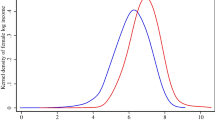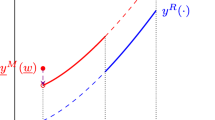Abstract
Economists usually assume that bargaining in marriage leads to efficient outcomes. The most convincing rationale for this assumption is the belief that efficient allocations are likely to emerge from repeated interactions in stationary environments, and that marriage provides such an environment. This paper argues that when a current decision affects future bargaining power, inefficient outcomes are plausible. If the spouses could make binding commitments–in effect, commitments to refrain from exploiting the future bargaining advantage–then the inefficiency would disappear. But spouses seldom can make binding commitments regarding allocation within marriage.
To investigate the efficiency of bargaining within marriage when choices affect future bargaining power, we consider the location decisions of two-earner couples. Initial location decisions are transparent and analytically tractable examples of choices likely to affect future bargaining power, but the logic of our analysis applies to many other decisions. For example, decisions about education, fertility, and labor force participation are also potential sources of inefficiency.
Similar content being viewed by others
References
Arrow, Kenneth J. (1974). The Limits of Organization. New York: W. W. Norton.
Aura, Saku. (2002, October). “Uncommitted Couples: Some Efficiency and Policy Implications of Marital Bargaining.” CESifo Working Paper No. 801.
Basu, Kaushik. (2001). “Gender and Say: A Model of Household Behavior with Endogenously-determined Balance of Power.” Working Paper, Cornell University.
Becker, Gary S. (1991/1981). Treatise on the Family, Enlarged edition. Cambridge: Harvard University Press.
Bergstrom, Theodore C. (1996, December). “Economics in a Family Way.” Journal of Economics Literature 34(4), 1903-1934.
Binmore, Kenneth G. (1985). “Bargaining and Coalitions.” In Alvin Roth (ed.), Game-Theoretic Models of Bargaining. Cambridge: Cambridge University Press, pp. 259-304.
Chiappori, Pierre-Andre. (1988, January). “Rational Household Labor Supply.” Econometrica 56(1), 63-89.
Costa, Dora L. and Matthew E. Kahn. (2000, November). “Power Couples: Changes in the Locational Choice of the College Educated, 1940–1990.” Quarterly Journal of Economics 115(4), 1287-1315.
Konrad, Kai A. and Kjell Erik Lommerud. (2000, May). “The Bargaining Family Revisited.” Canadian Journal of Economics 33(2), 471-487.
Ligon, Ethan. (2002). “Dynamic Bargaining in Households (With an Application to Bangladesh).” Working Paper, University of California, Berkeley.
Lundberg, Shelly and Robert A. Pollak. (1993, December). “Separate Spheres Bargaining and the Marriage Market.” Journal of Political Economy 101(6), 988-1010.
Lundberg, Shelly and Robert A. Pollak. (1996, Fall). “Bargaining and Distribution in Marriage.” Journal of Economic Perspectives 10(4), 139-158.
Lundberg, Shelly, Richard Startz, and Steven Stillman. (2003, May). “The Retirement-Consumption Puzzle: A Marital Bargaining Approach.” Journal of Public Economics 87(5–6), 1199-1218.
Mincer, Jacob. (1978, October). “Family Migration Decisions.” Journal of Political Economy 86(5), 749-773.
Peters, H. Elizabeth. (1986, June) “Marriage and Divorce: Informational Constraints and Private Contracting.” American Economic Review 76(3), 437-454.
Pollak, Robert A. (2003, January–April). “Gary Becker's Contribution to Family and Household Economics.” Review of Economics of the Household 1(1–2), 111-141.
Rubinstein, Ariel. (1982, January). “Perfect Equilibrium in a Bargaining Model.” Econometrica 50(1), 97-109.
Shubik, Martin. (1989). “Cooperative Games.” In John Eatwell, Murray Milgate, and Peter Newman (eds.), The New Palgrave, Game Theory. New York: W.W. Norton, pp. 103-107.
Zhang, Junsen and William Chan. (1999, August). “Dowry and Wife's Welfare: A Theoretical and Empirical Analysis.” Journal of Political Economy 107(4), 786-808.
Author information
Authors and Affiliations
Corresponding author
Rights and permissions
About this article
Cite this article
Lundberg, S., Pollak, R.A. Efficiency in Marriage. Review of Economics of the Household 1, 153–167 (2003). https://doi.org/10.1023/A:1025041316091
Issue Date:
DOI: https://doi.org/10.1023/A:1025041316091




